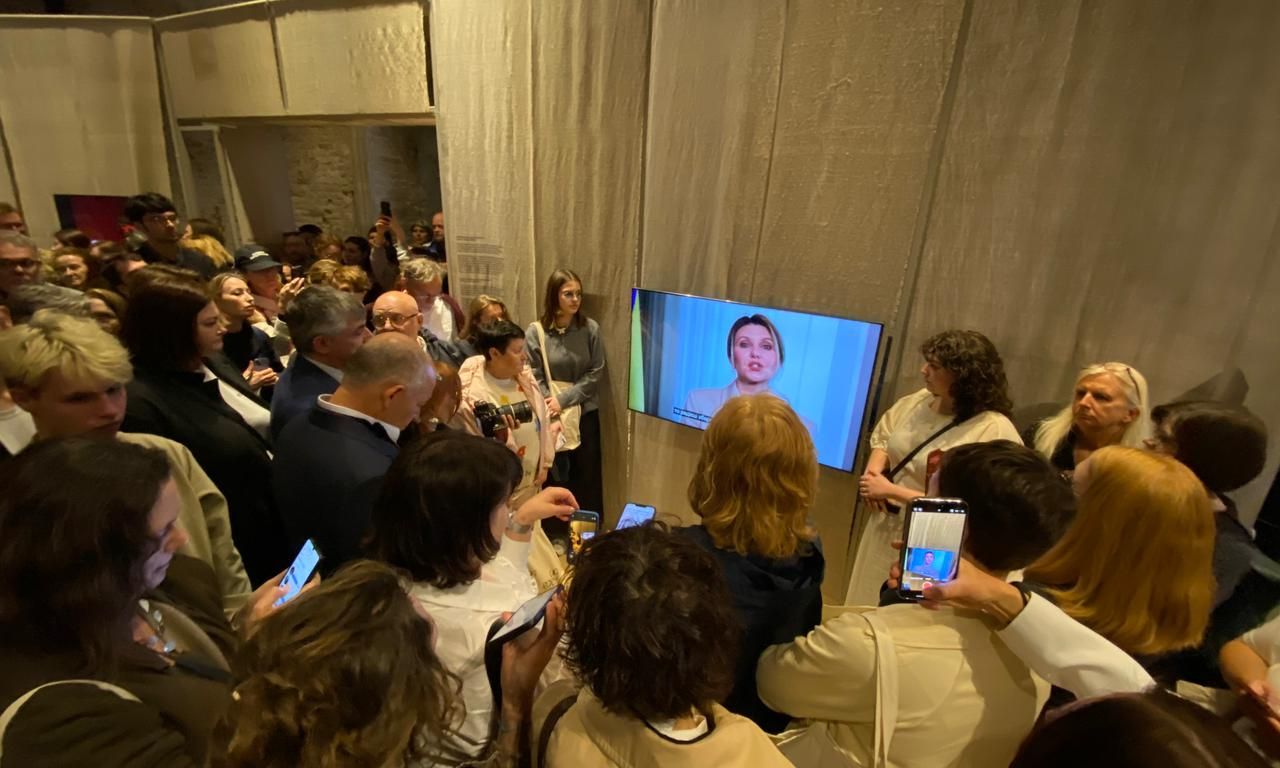Olena Zelenska giving a video address at the opening of the Ukrainian pavilion
Photos: Borys Filonenko
The first lady of Ukraine, Olena Zelenska, gave a video address on 18 April to mark the launch of the Ukrainian pavilion at the Venice Biennale (20 April-24 November), reminding audiences that “dozens of Ukrainian artists worked in our cities under shelling and air raids so that this pavilion can be opened in Venice”.
At the last edition of the Venice Biennale in 2022, President Zelensky of Ukraine gave a rousing speech to an audience, urging those visiting the exhibition This is Ukraine: Defending Freedom to “support this fight with your art”. His appeal came two months after Russia invaded its neighbour.
This time his wife Olena doubled down on the significance of Ukraine’s inclusion in the world’s most prestigious art exhibition. “Even in times of mortal threat [in the wake of the Russian invasion], the desire to create is still there”. She added: “Art will not save us from bombs and bullets. But it will save our conscience, our humanity, and our values.”
The Ukrainian pavilion, located in the Arsenale, is entitled Net Making, referring to the manufacture of nets used by the Ukrainian armed forces to conceal weapons. “A lot of people in Ukraine, both young and old, gather after work or school to weave camouflage nets…We are all weaving mental nets trying to bind together our lives that were torn apart by the attack,” said Zelenska in the pre-recorded film.
Participating artists include Andriy Rachinskiy and Daniil Revkovskiy whose film, Civilians. Invasion (2023) comprises YouTube footage shot in the wake of Russia’s assault in February 2022. “There is no art more powerful and truthful than war documentary,” Zelenska said.
The exhibition also includes contributions by 15 neurodiverse artists who collaborated with Katya Buchatska on the piece Best Wishes. “In Best Wishes, Buchatska focuses on aspects of language such as idioms and phrases that neurotypical people use, and their interpretation by neurodivergent people,” says a project statement.
Andrii Dostliev and Lia Dostlieva are presenting a video installation entitled Comfort Work (2024). The pair say in an online statement: “We hired ten actors from the EU and the UK to perform in front of the camera the roles of those types of Ukrainian refugees which are preferred by various communities in their own countries.”
The Goethe-Institut, the British Council, the University of Liverpool and PEN America’s Artists at Risk Connection (ARC) are among the pavilion's supporters. Its public programming is partly funded by Museums for Ukraine, an initiative founded by the philanthropist Francesca Thyssen-Bornemisza.
“It does not matter for them [Russia] what to destroy: our infrastructure or our cultural heritage. When you walk the streets of beautiful Venice, you’re delighted to see its antiquity and beauty preserved. Meanwhile the beauty and antiquity [of] Ukraine is being destroyed every day… On the sites of ruins we want to build and re-build,” Zelenska added.

